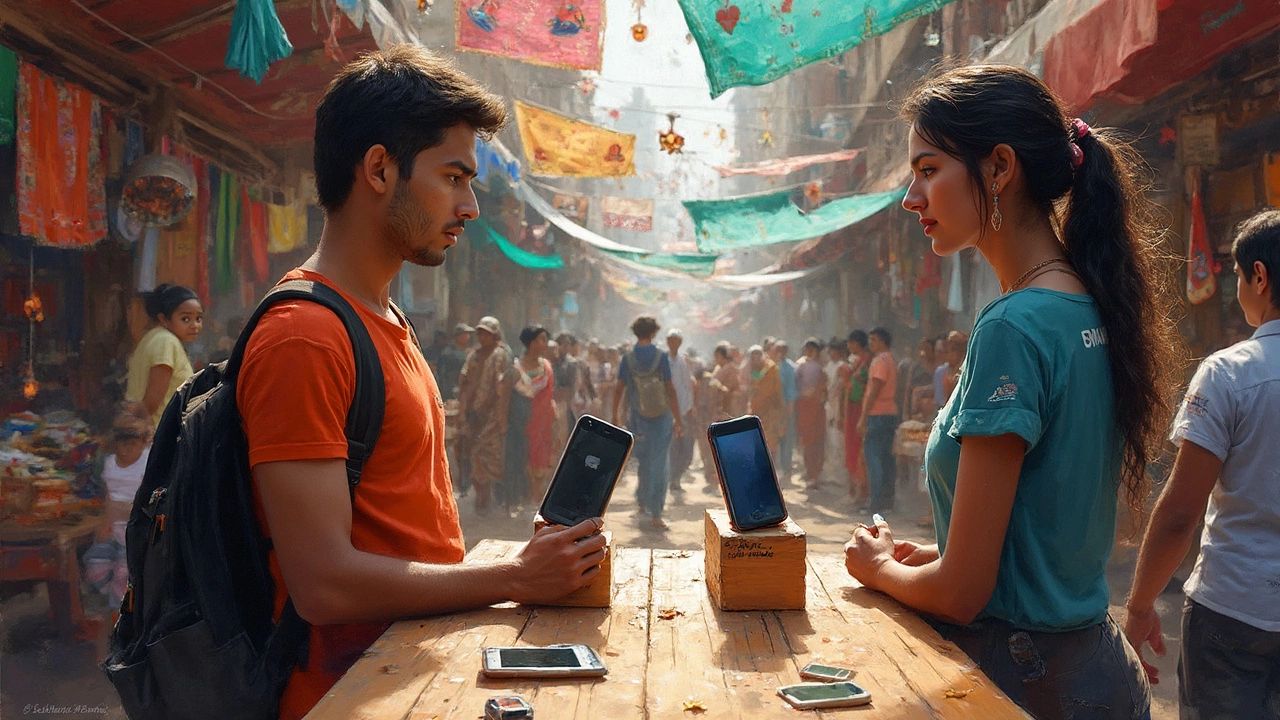
So, you're caught in the iPhone vs. Samsung dilemma? You're not alone. These tech giants have been at it for years, pushing out flashy phones with game-changing features. But which one should you go for? Let's kick things off by examining their design and build quality.
Now, both brands know how to make a phone look good. Apple's iPhones have that classic sleek design with a robust build. They're like the minimalistic artist who knows what they’re doing. On the other side, Samsung’s flagships flaunt impressive displays with vibrant colors—bonus points for the curved edges. Your choice might boil down to personal preference here, whether you lean towards Apple's iconic aesthetic or Samsung's bold and bright approach.
- Design and Build Quality
- Operating Systems and User Experience
- Performance and Battery Life
- Camera Capabilities
- Ecosystem and Additional Features
- Price and Value
Design and Build Quality
Design and build quality are among the first things people notice when choosing between an iPhone and a Samsung. A major talking point is Apple's knack for minimalism. They're consistent with a design language that looks elegant and held together solidly. We're talking aerospace-grade aluminum and ceramic shield—it's built like a tank but doesn't feel like one.
Now, flip over to Samsung. They love playing with materials and designs that stand out. The Galaxy phones often flaunt glass bodies with metal accents, and let's not forget about those vibrant, edge-to-edge screens. Some even say their displays are the best in the smartphone business.
Material Choices and Durability
An iPhone typically rocks a sturdy and classy exterior that's less prone to scratches, thanks to Apple's specific blend of aluminum and glass. In contrast, Samsung experiments a lot more with its materials, particularly with their use of Gorilla Glass to boost durability.
“Samsung's penchant for innovative design is evident through its consistent experimentation with form and materials.” – TechRadar
User Feedback and Practical Experience
When it comes to real-world use, both camps have their fans. Many iPhone enthusiasts praise the seamless integration of design with function. Meanwhile, Samsung users often rave about the immersive quality of its displays. Personal style plays a big role here—clean and simple versus bold and expressive. Which calls to you more?
Whether you're leaning towards an iPhone's iconic look or Samsung's pioneering flair, what matters is it feels just right in your hand. After all, you'll be holding it a lot!
Operating Systems and User Experience
When it comes to operating systems, the iPhone and Samsung play in different leagues. The iPhone runs on iOS, Apple's very own tight-knit operating system, while Samsung smartphones are powered by Android, specifically a Samsung-customized version called One UI. Both have their perks, but what do they offer you?
iOS: A Seamless Experience
If you like things to be smooth and straightforward, Apple's iOS could be your jam. It’s known for its polished interface and simplicity, making it easy even for tech novices. Updates are frequent and come straight from Apple, ensuring you're always getting the latest features and security patches. Plus, the App Store is loaded with quality apps optimized to make the most out of Apple's hardware.
One UI: Flexibility at Your Fingertips
Samsung’s phones, running on One UI, offer a different vibe. If flexibility and customization are your thing, One UI's your playground. You can pretty much tweak the look and feel to your heart's content. There's also a wider selection of apps on the Google Play Store. The catch? Updates can delay a bit because Samsung adds its own twist before rolling them out.
What About the Usability?
For ease of use, both systems have their unique selling points. iOS might win over those who love consistency and a seamless connection with other Apple products like the MacBook or iPad. Samsung stands strong with features like split-screen multitasking, allowing you to do more at once. So, are you looking for simplicity or flexibility? It might be as simple as that.
| Aspect | iPhone (iOS) | Samsung (One UI on Android) |
|---|---|---|
| User Experience | Simple and uniform | Highly customizable |
| Updates | Regular and timely | Can be delayed |
| App Availability | Curated quality apps | Wider selection |
There’s no one-size-fits-all here. Whether you’re an iPhone or Samsung person depends on your lifestyle and tech preferences. Are you team Apple or team Samsung? Whatever you choose, you’re not just buying a phone; you’re opting into an experience.
Performance and Battery Life
When it comes to performance, both iPhone and Samsung have been racing neck-and-neck. Apple's latest chip, the A17 Bionic, is a powerhouse known for its speed and efficiency. If you're into gaming or running heavy apps, the iPhone won't break a sweat.
Meanwhile, Samsung's new Exynos 2200 and Snapdragon 8 Gen 2 processors aren't slacking off either. They're robust in handling multitasking and power-hungry applications. It's fair to say, whether you're an iPhone fan or a Samsung buff, you won't feel like you're missing out in the performance department.
Battery Life
This is where things get interesting. The iPhone 14 Pro Max is optimized for longevity, often lasting more than a full day with regular use. Thanks to Apple's knack for hardware and software integration, the battery efficiency sees some premium optimization.
On the flip side, Samsung has packed hefty battery capacities in its flagship models like the Galaxy S23 Ultra, which also strives to stretch out a day's use. In real-world usage, it strikes a fair balance with adaptive battery features that contribute to better performance over time.
| Model | Battery Capacity | Approximate Usage Time |
|---|---|---|
| iPhone 14 Pro Max | 4323 mAh | Up to 28 hours |
| Samsung Galaxy S23 Ultra | 5000 mAh | Up to 26 hours |
Both companies have also jumped on the fast charging bandwagon, with Apple adopting MagSafe and Samsung continuing with their super fast charging tech. With both options, you won't be tethered to a wall for long.
At the end of the day, if you're a road warrior who can't afford the dreaded low-battery warning, you can't go wrong with either brand. They’ve got your back with features ensuring your device stays juiced up as long as possible.

Camera Capabilities
When it comes to choosing between an iPhone and a Samsung, the camera often holds a lot of weight. Both brands have significantly pushed the envelope with their camera tech but in slightly different ways.
iPhone Cameras
The latest iPhone models focus heavily on simplicity and quality. Their camera software excels in providing natural-looking photos. Features like Smart HDR and Deep Fusion enhance your pictures with more detail and vibrant colors without heavily editing the photo. Portrait lighting and night modes are well-loved for making everyday snaps look professional.Samsung Cameras
Samsung, on the other hand, rolls out features like crazy. Their flagships boast higher megapixel counts and versatile multi-camera systems. The Space Zoom and Single Take modes are huge draws for tech enthusiasts who want top-of-the-line gadgets. Samsung's approach usually involves giving you more ways to edit and play around with your photos.Comparative Features
- Picture Quality: iPhones are renowned for color accuracy; Samsung offers more vibrant and expressive colors.
- Zoom Capabilities: Samsung typically provides more extensive zoom features.
- Night Photography: Both brands have competitive night modes, though iPhones often emphasize realism.
What's the Verdict?
The best pick will depend on what you prioritize. Want an easy-to-use, point-and-shoot that nails those everyday photos? An iPhone might be your go-to. But if you're the kind who loves experimenting with different settings and angles, Samsung might have the features to float your boat.
| Feature | iPhone | Samsung |
|---|---|---|
| MegaPixel Count | Typically 12 MP | Ranges from 12 MP up to over 100 MP |
| Video Quality | Up to 4K at 60fps | Up to 8K |
| Special Modes | Smart HDR, Deep Fusion | Space Zoom, Single Take |
Ecosystem and Additional Features
When it comes to ecosystem and additional features, the debate between iPhone and Samsung takes on a new dimension. Apple users often boast about the seamless syncing across devices. Imagine starting an email on your Macbook and finishing it on your iPhone without a hitch. The magic is in iCloud, Apple's nifty little data hub, keeping everything within arm's reach on all your devices.
Samsung, however, isn't hanging back. They offer their own ecosystem with Galaxy phones, tablets, TVs, and wearables like the Galaxy Watch. SmartThings gives Samsung users a way to control compatible smart home devices right from their Galaxy devices. Plus, Samsung's DeX feature turns your phone into a desktop-like experience. How cool is that, if you need a mini work station on the go?
Exclusive Features
Let’s talk about some exclusive goodies. Apple provides Face ID and the ever-popular Siri for smart assistant needs. Meanwhile, Samsung counters with features like reverse wireless charging, letting you use your phone to charge devices like earbuds and watches. This can be a real lifesaver when your battery's running low.
Both brands have their own app stores, with Apple's App Store known for tight security, which keeps your device a bit safer. The Google Play Store on Samsung phones gives you more customization, reflecting the varied tastes of Android users. Basically, it's about how much control you want versus how much you value seamless experience.
Which One Suits You?
If you're already embedded in one ecosystem, like owning multiple Apple products, it makes sense to stick with it for that smooth interoperability. But if you're more of a lone wolf and love trying different gadgets, Samsung gives you that flexibility. It's like choosing between a close-knit family dinner with Apple, or a vibrant, open-tech market with Samsung.
The choice of ecosystem often boils down to how you use your gadgets daily. Do you want everything to work together effortlessly, or do you crave versatility and options? Understanding your needs can guide you to pick the perfect ecosystem.
Price and Value
We're talking bucks now—how much will your fancy new iPhone or Samsung phone set you back? Let's break it down.
When it comes to pricing, Apple typically sits on the premium corner of the market. If you're planning to invest in the latest iPhone, be ready to shell out a handsome sum. But here's the kicker—they hold their resale value like champs. An iPhone you buy today will still fetch a decent price even a couple of years down the line. That’s Apple’s secret sauce: the brand loyalty and the promise of a polished ecosystem.
Samsung, on the other hand, offers a broader range of options. From budget-friendly models to high-end flagships, they cater to all wallets. The high-end Samsung models compete directly with iPhones price-wise but often come with promotional offers that can make your purchase feel like a steal.
Resale Value Comparison
If resale value is something you care about, let’s look at some numbers:
| Brand | Resale Value After 1 Year | Resale Value After 2 Years |
|---|---|---|
| iPhone | 85% | 70% |
| Samsung | 75% | 60% |
You can see iPhones generally hold value longer. This isn't to say Samsung phones aren't worth it—far from it! They tend to be packed with features and often have early discounts or trade-in deals that soften the blow on your wallet.
At the end of the day, it boils down to how much you're ready to spend and what you prioritize in a smartphone. Want longevity in both tech and resale? An iPhone might be your best bet. Looking for value without missing out on the latest tech features? Samsung's diverse lineup has got you covered.